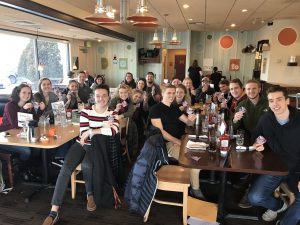When I first signed up for Neurochemistry last spring, I was incredibly nervous to take the class. Having recently added a neuroscience minor to my music and psychology majors, I was afraid that I was not going to have enough background  knowledge to succeed or understand the content in this class. Once we got into the rhythm of the class, I was pleasantly surprised that I was not as behind as I thought. Neurochemistry was a great class to have a capstone experience for many reasons.
knowledge to succeed or understand the content in this class. Once we got into the rhythm of the class, I was pleasantly surprised that I was not as behind as I thought. Neurochemistry was a great class to have a capstone experience for many reasons.
First, the class itself was set up in a way that I have never experienced before. It is uncommon to be able to spend 3 class meetings on a single topic or article – I was glad we were able to do that. Especially in the sciences, the majority of our undergrad classes are spent rushing through as much lecture that will fit into a class period. First, deciphering difficult concepts in the articles we read was crucial to retaining information from about dense topics. I always felt that we could have continued conversations about each topic for another hour after class was over. After we figured out what we didn’t know, we were able to research interesting topics based on our requests. Having the ability to write out our own questions and interests for people to research for next class was so beneficial. We were able to be the teachers and the learners every week. Have that dual role in a classroom is difficult to achieve, but was done very well in this class. Lastly, my favorite part of the week was on Fridays when we would get out of the classroom and discuss freely. Physically leaving the normal classroom and extending class to another part of campus is fantastic for keeping students alert and interested. Fridays were a time to really dive in to the societal issues of each topic and also showed off Concordia’s liberal learning goal of “instilling a love for learning.”
Secondly, Neurochemistry worked so well as a capstone because we were able to use information from so many of our past classes in order to understand the content fully. For example, to learn about how a disease works in someone’s body, we could pull knowledge about the molecular level of signal pathways in the brain and out to the body, the chemical makeup of a neurotransmitters malfunctioning in the disease, and many more areas of study. This is a perfect example of another goal of liberal learning, which says “develop foundational skills and transferable intellectual capacities.” What better way to do that then in this class. I was so thankful to have peers who knew so much about chemistry that I could learn from them and be brought up to their level while still sharing my knowledge of neuroscience and psychology.
Lastly, Neurochemistry exemplified what a capstone class should be like by being low-pressure class. What I mean by this is that it was not centered around grades, tests, or lab quizzes. Having a class at Concordia where people were striving to achieve the highest grade or just studying content to do well on the tests is vital to creating a holistic, liberal arts education. Grades were not mentioned by the professor nearly as much as they are in other classes. That created an environment in which the focus of the class was to simply learn about and explore different diseases that affect our society today. I appreciated having a low-pressure feel to this class – it felt like a perfect way to tie together all of these classes we have taken pertaining to these topics.
While there are many other reasons why Neurochemistry worked so well as a capstone class at Concordia, these were my main reasons that I thought about several times throughout the semester. I look forward to using this class when discussing diseases further in graduate school, at interviews with institutions that work with people suffering from these diseases and topics, as well as when discussing my education overall. Having the knowledge achieved from our 4 years at Concordia will only send us to bigger and better places in the future. Thank you for a fantastic capstone experience!